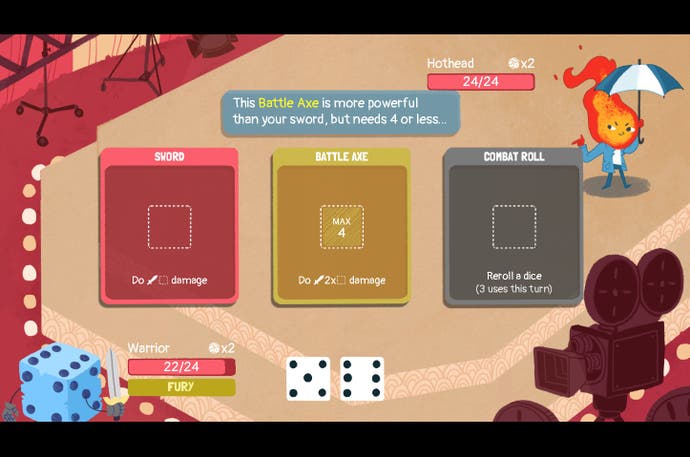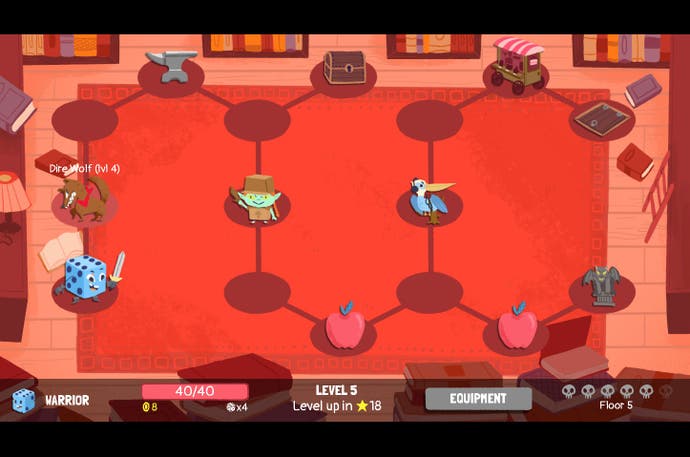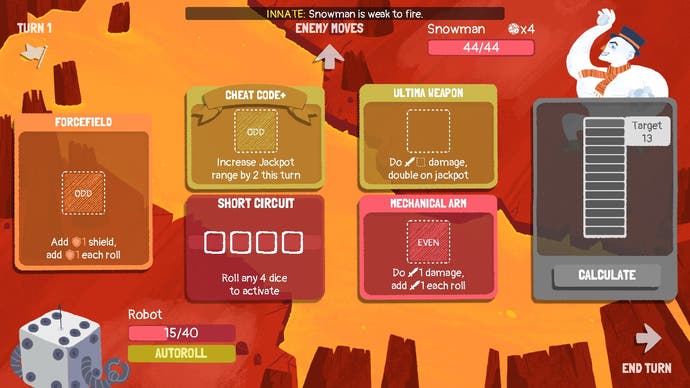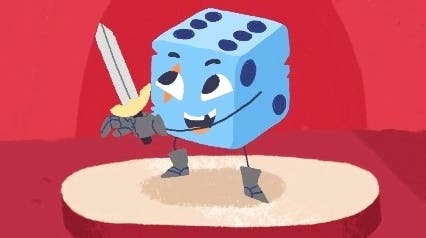Dicey Dungeons Review - I never knew a d6 could do so much
Paradice.
How many uses can one d6 die have? According to Dicey Dungeons, the new game by prolific designer Terry Cavanagh - famed for VVVVVV and Super Hexagon - the answer is quite a few.
Dicey Dungeons riffs, tongue-in-cheek, on a gameshow. You're a contestant playing for a chance to spin the wheel and win your heart's desire, if you reach the end of the dungeon, that is. And you're a die, a d6 die (a wry observation on how characters in games boil down to the same thing, I think). There are a few contestant-characters to choose between once you really get going, but to begin with, there's only one: the Warrior, the simplest, the one-star difficulty character.
Combat works by rolling dice, surprise surprise, and dragging them onto equipment or abilities - represented by boxes on your screen - to use them. The game rolls dice for you but you decide what to do with them. If you're rolled a six, for instance, you could drag it onto - and therefore use - your sword and deal six points of damage. But it's not always so simple.

Items and abilities have requirements. Some require odd numbers, some even. Some require you roll a three or higher, and some, a three or lower. Some have a big number to incrementally whittle down, turn by turn, and others can be used more than once. There are also abilities and equipment which affect the dice themselves, rerolling or combining them, or nudging them up or down a point. The permutations are many.
Buffs and debuffs mix this further. You can shock, freeze, burn, curse, poison, weaken and blind opponents, providing you roll the right numbers, and doing so messes with the opponents' dice, equipment and abilities. Shocking, for instance, locks an opponent's equipment or ability and requires they spend a die reactivating it, whereas Weaken alters the ability or equipment's power and requirements. Cursing makes them disappear when used - it's a good one!
You can change your equipment and abilities between fights according to what you pick up along the way, be it in a chest, at a merchant or via levelling up. There are a lot of options. As long as it all fits in the grid space you're given, you can use it, so you're free to swap builds to adjust to enemy types, capitalising on weaknesses like fire, for instance.

As the Warrior, the simpleton, Dicey Dungeons doesn't require much thought and you will probably breeze through, but as you gradually unlock more characters, the game becomes harder, one difficulty star at a time. I don't want to spoil all the characters because I want you to discover them yourself, but each one can fundamentally alter how Dicey Dungeons plays. I'll spoil one, though - the robot - because it's my current fave, the three-star difficulty character (I haven't done so well with the four- and five-starrers, and the six-starrer - presumably - remains a mystery to me!).
The robot doesn't have dice automatically rolled each turn and you don't add a new die every character level you reach, as most other characters do (six is the maximum level). Instead, the robot fills a 10-point gauge. If you hit it then you score a jackpot and are rewarded with the option of a few special abilities. But if you go over the gauge limit, you error, glitching your abilities out of use. The robot is a gambler, in other words, each roll a stick or twist. Fudge it and you could throw your turn.
It's how you exploit each character's mechanic, through equipment and abilities, that becomes the game. Let me give you an example. Every time my robot levelled up, it gained CPU (it's a witty game), increasing the upper limit of my gauge - theoretically allowing me to roll more dice. And rolling more dice meant some of my equipment, which gets one-point stronger with each roll, became more powerful. It also meant debuffs like freeze suddenly became useful when used on me, because rolling one-point dice (the effect of being frozen) meant I could roll more dice, which in turn made my equipment more powerful. On top of that, I added abilities to increase my jackpot range, meaning landing anywhere between 11-13 would hit it, and an ability which did double damage when used after a jackpot. Combinations, combinations! It's the same for all characters, and the trickier they are, the better.

So the game goes: play through one character and unlock another until you've tried them all. But that's not the end of it. Each short dungeon run is considered an Episode, and when you finish one, killing the end boss, another unlocks, and each Episode has rules of its own. One even went so far as to change my robot's gauge completely so I could specify the number I wanted to roll but had a dicey (sorry!) 50 per cent error rate attached to it. Each time I errored, the number locked and an ability disappeared, so I had to come up with a whole new strategy for dealing with it. Consider there are several characters, with several episodes for each of them, and there's a lot here to play.
It is remarkable how much can come from a d6. One little adjustment here, one tiny alteration there, and Dicey Dungeons feels like a new game. Perhaps it's because the variables are so few - one die type, one fundamental idea - the changes feel so dramatic. Whatever the reason, every time you jump into a new character, you're considering a familiar puzzle anew. New tools, new strategies - every change requires a rethink. And thinking, really, is what it's all about, why people go back to crosswords or sudokus (do people still play those?), to stretch their brains within familiar puzzling environments.
It's exactly what Dicey Dungeons is going for, if you ask me - and it nails it. It's as lean as a gazelle, and quick and pacey to play and return to. What's more, it welcomes you each time with the cheery warmth of a children's book. It's exactly the kind of game you can fire up for 10 minutes or a lunch break, and exactly the kind of game you will want to. It's a joy.










